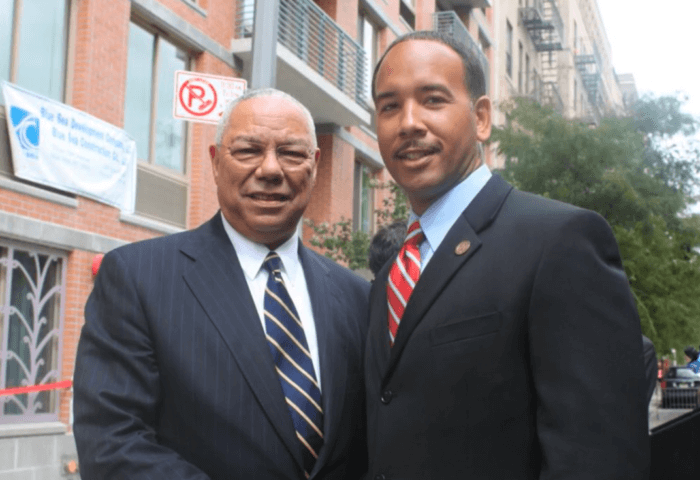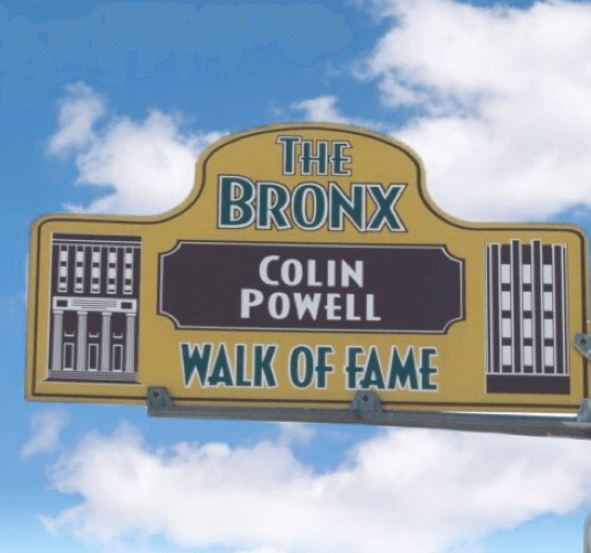From being one of the top generals in the U.S. military to an ascension that led him to being one of the highest-ranking Black diplomats in American history, former Secretary of State Colin Powell made his mark in Washington D.C. But with news of his passing today, his roots remain firmly etched in the South Bronx.
Powell, 84, died Monday morning due to complications from COVID-19. Powell, who had been fully vaccinated but also battling multiple myeloma, succumbed to the virus while undergoing treatment at Walter Reed National Medical Center in Bethesda, Maryland, according to a statement released by the Powell family on Powell’s Facebook page.
Powell, a son of Jamaican immigrants was born in Harlem in 1937, but moved to the Hunts Points section of the Bronx when he was just 6. Powell’s first home was at 980 Fox St., and then he moved to 952 Kelly St., which are only two blocks away from a housing development that today bears his namesake.
Bronx Borough President Rubén Díaz Jr., said that Powell — who is one of the 110 Bronx-bred luminaries in the Bronx Hall of Fame that lines a 23-block corridor along the Grand Concourse — never forgot his Bronx roots.

“Our borough has lost a giant today,” tweeted Diaz Jr. “A true trailblazer by becoming the first African-American Secretary of State. Thank you for your years of service and never forgetting The Bronx.”
Powell is also product of NYC public schooling, attending PS 39 which is now a community center along with Intermediate School 52 and Morris High School. In his words, Powell said he was “raised in the South Bronx, went to public school, got out of public college, went into the Army, and then I just stuck with it.”
Powell joined the U.S. Army in 1958 upon graduation from City College, where he initially enlisted in the school’s ROTC. He served two tours of duty in Vietnam and continued rising through the ranks, eventually attaining the status of four-star general.
Powell came to national prominence in October 1989, when then-President George H.W. Bush appointed him chairman of the Joint Chiefs of Staff, the most senior ranking status in the U.S. military, and the first African American ever to hold the post. Powell is credited for his role with Operation Desert Storm, an allied effort to drive Iraqi forces out of invaded Kuwait.
Caesar Manuel, a Bronxite who served under Powell’s command during the four-star general’s time as battalion leader with the Armored Division 23rd Infantry Division, told the Bronx Times it was “an honor” to follow in the military path paved by Powell as both a Bronxite and a Black immigrant.
“Colin Powell’s name doesn’t just mean something to me as a service member, but also as someone who grew up in the same neighborhood he did and experienced similar challenges as a Black man in the army,” Manuel said. “He’s a Bronx icon and a Black icon, and I’m proud to have been under his command.”
Powell served as joint chiefs chairman through September 1993, when he resigned after clashes with members of the Clinton administration. After joining the private sector, he re-entered public service in 2001 as secretary of state in President George W. Bush’s administration.
The Sept. 11, 2001, terrorist attacks led the junior Bush’s administration to launch the “war on terror,” first against Afghanistan — but the focus later shifted to Iraq, which the administration claimed harbored terrorists and weapons of mass destruction.
Powell famously appeared before the United Nations Security Council in February 2003 to make the U.S. case for war against Iraq, displaying evidence that suggested Iraq, under Saddam Hussein’s dictatorship, had amassed biological weapons and was rapidly developing nuclear arms.
The retired four-star general’s decades-long legacy was marred by that 2003 speech to the United Nations Safety Council, and he stated in later interviews that the speech was a “blot” that can “all the time be part of my file,” including that “it was painful.”

In his later years, Powell stayed out of the national political spotlight, never running a campaign for public office following his time in the Bush administration, but he noted that he switched from Republican to an Independent, in a repudiation of the Jan 6. 2021 attack on the U.S. Capitol that was fueled by far-right extremists and pro-Trump groups.
Powell’s legacy continues to loom large in the Bronx, resembling that of a hometown product who made good and became a pioneer for Black Americans in the political and diplomatic sphere with each new career accomplishment.
The list of honors of Powell in the Bronx include several neighborhood murals and the aforementioned affordable housing apartment complex that bears his name on Leggett Avenue.
In his own words, Powell wanted to be seen as a boy from the Bronx that came to be a general, and was always paving the way for others to succeed.
“I watched the tragedy of the Bronx,” Powell said during a ribbon-cutting ceremony for the Powell Apartments in 2010. “I’ll never forget the day I drove through with my young children and pointed to an empty lot and said that was where I grew up. And then this community began to come back.”
Alongside his many navy honors, he additionally earned the Presidential Medal of Freedom twice, the Congressional Gold Medal and an award from the NAACP.
Powell is survived by his wife of 59 years, Alma Johnson, and their children Michael, Linda and Annemarie.
Reach Robbie Sequeira at rsequeira@schnepsmedia.com or (718) 260-4599. For more coverage, follow us on Twitter @bronxtimes and Facebook @bronxtimes.




















